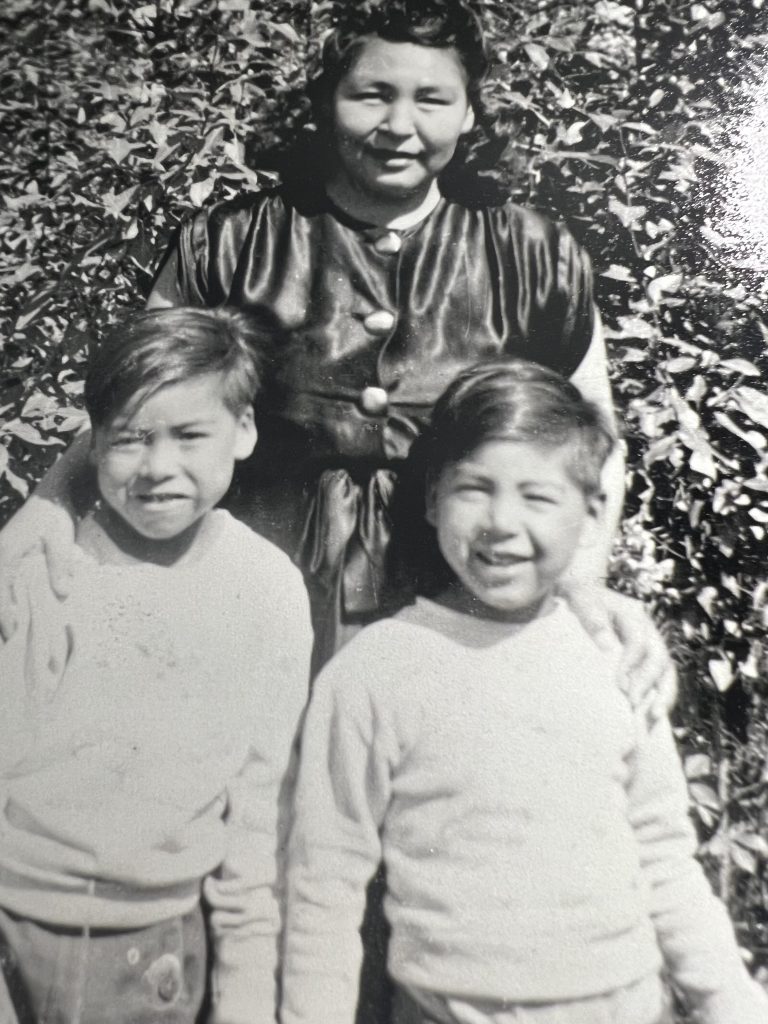Podcast: Play in new window | Download | Embed
Photo: Jim LaBelle, left, and his younger brother Kermit, shortly before they were taken away from their mother in Fairbanks and sent to the Wrangell Institute in Southeast Alaska. (Courtesy Jim LaBelle)
Alaska Native people are among those reacting to President Joe Biden’s apology for the harm done to generations of Native children who were taken from their homes and forced to attend federal Indian boarding schools.
President Biden delivered the apology at the Gila River Indian Community in Arizona last week.
KNBA’s Rhonda McBride has more from Alaska.
Among the boarding school survivors in the crowd was Jim LaBelle, an Alaska Native member of the National Native Boarding School Healing Coalition.
He says, before the speech, the President and Interior Secretary Deb Haaland (Laguna Pueblo) embraced him and his wife.
“It’s almost indescribable, how to express that feeling of acknowledgement. It was just a very spiritual moment, I think, where he just understood why, why we were there.“
LaBelle says the president’s apology was a powerful gesture, but there are those who never recovered from boarding school trauma – and died young from addiction and suicide.
He says hopes their spirits heard the president’s words.

Benjamin Jacuk is the head Indigenous researcher at the Alaska Native Heritage Center in Anchorage. His grandfather, Mack Dolchok, was a boarding school survivor. (Photo: Rhonda McBride)
From 1878 to almost a hundred years later, Alaska had more than a hundred federally funded schools for Native children – a time in which they were punished for speaking their language as well as physically and sexually abused.
“It really is a big deal.”
Benjamin Jacuk watched the livestream of the president’s apology from his office at the Alaska Native Heritage Center in Anchorage, where he’s the head researcher for boarding school history.
“While an apology is welcomed and amazing, the work should never end right here, because this is just the beginning.”
Jacuk says, without truth, there can be no healing. And without action, no meaningful apology.
The Alaska Federation of Natives had praise for the President Biden’s apology, but called for tangible steps towards healing and justice – such as a comprehensive inquiry into the Indian boarding school era and the revitalization of the Native languages and cultures they nearly destroyed.
View this post on Instagram
A U.S. House resolution would have “Columbus Day” replaced by “Indigenous Peoples’ Day” if a California Congresswoman’s proposed legislation becomes law.
Brian Bull reports.
U.S. Rep. Norma Torres’ (D-CA) bill would also make the second Monday of October a federal holiday.
A member of the Congressional Native American Caucus, Rep. Torres says this recognition would celebrate the history, culture, and resilience of the continent’s original inhabitants.
“Native Americans welcomed the Europeans, sharing traditions, sharing food with them. And I think that we should recognize that this was all over their lands, and we should respect them for that.”
Italian-Americans promoted Christopher Columbus as the discoverer of the Americas, as a way to instill pride in their community, and as a counter anti-Italian sentiment in the early 20th century.
But after historical accounts of the explorer’s abuse and enslavement of Indigenous people came to light, a growing number of states and cities have opted to honor Native Americans.
Torres is the sole member of Congress to introduce this legislation.
86 other U.S. House Representatives are co-sponsors, all Democrats.

Yei Bi Chei rug. (Courtesy Navajo Nation)
A set of ceremonial Yei Bi Chei masks has been returned to the Navajo Nation.
Richard Begay, manager of the tribe’s heritage and historic preservation department, says the cultural items are now back home.
Begay says the donor did not have a complete history of the masks, but received them from friends.
The 11 masks were returned from the San Francisco Bay area.
Navajo Nation President Buu Nygren says the items used in ceremonies are vital resources and their return ensures survival of Navajo people and culture.
Begay also says it’s important for the return of cultural items to Navajo people, who view them as integral to their heritage.
According to the tribe, the last known return of Yei Bi Chei masks were in 2014 when the Navajo Nation sent a delegation to France to retrieve seven masks from a Paris auction house.
Additionally, the department says a saddle blanket, traditional basket, and historic rugs were given back to the Navajo Nation from another donor.
Get National Native News delivered to your inbox daily and stay up-to-date on the 2024 Native Vote. Sign up for our daily newsletter today.



